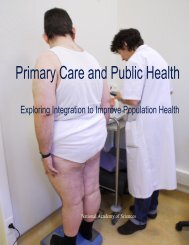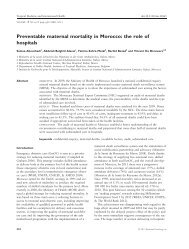Preventing Childhood Obesity - Evidence Policy and Practice.pdf
Preventing Childhood Obesity - Evidence Policy and Practice.pdf
Preventing Childhood Obesity - Evidence Policy and Practice.pdf
You also want an ePaper? Increase the reach of your titles
YUMPU automatically turns print PDFs into web optimized ePapers that Google loves.
Chapter 30<br />
Forty - three countries in the European region are now<br />
members of this network. The basic values underpinning<br />
the health promoting school approach are:<br />
• equity<br />
• active participation of students<br />
• development of students ’ action competence<br />
• importance of the social <strong>and</strong> physical environment<br />
of the school<br />
• integration of health promotion policies as part of<br />
school development.<br />
In 1997, the first European conference on school<br />
health promotion resulted in the identification of ten<br />
principles for school health promotion, 11 including<br />
democracy, equity, empowerment <strong>and</strong> partnership. In<br />
this network it was recognized that health <strong>and</strong> education<br />
are closely linked. Health status is related to<br />
access to schools as well as the ability to learn. There<br />
is a lot of evidence indicating that healthy students<br />
learn better <strong>and</strong> that improving the knowledge, competencies<br />
<strong>and</strong> health status of children will improve<br />
learning outcomes. 3 Also, schools that use the health<br />
promoting school approach improve at a faster rate<br />
than schools that do not use this approach. Effects<br />
have been demonstrated in improving learning<br />
environments, student concentration <strong>and</strong> performance,<br />
staff health <strong>and</strong> well - being, <strong>and</strong> better student<br />
12<br />
achievements.<br />
Many studies have been carried out to investigate<br />
the effectiveness of the whole school approach.<br />
Overall, it can be concluded that the school health<br />
promotion programs that were effective in changing<br />
young people ’ s health or health - related behavior were<br />
likely to be complex, multi - factorial <strong>and</strong> involve activity<br />
in more than one domain (curriculum, school<br />
environment <strong>and</strong> community). Also, programs that<br />
are intensive <strong>and</strong> implemented over a long period of<br />
time are more effective than programs of short duration<br />
<strong>and</strong> low intensity. Finally, school health promotion<br />
can be effective, particularly in improving mental<br />
health <strong>and</strong> in promoting healthy eating <strong>and</strong> physical<br />
activity. 5<br />
Recent evidence3 makes clear that a whole school<br />
approach, which encourages <strong>and</strong> recognizes student<br />
participation <strong>and</strong> which addresses the building <strong>and</strong><br />
maintenance of a caring school social environment,<br />
may be the most effective way to achieve both health<br />
<strong>and</strong> educational outcomes. Important influences that<br />
build health protective factors <strong>and</strong> reduce risk - taking<br />
behavior, are: the way a school is managed; how the<br />
school encourages student participation in shaping<br />
policies, practices <strong>and</strong> procedures; how teachers relate<br />
to <strong>and</strong> treat students; <strong>and</strong> how the school engages with<br />
its local community <strong>and</strong> parents in partnership work.<br />
The supporting role of the school management<br />
is recognized as an important factor to start the<br />
process of introducing <strong>and</strong> implementing the health -<br />
promoting school approach.<br />
Selection of g ood p ractice<br />
Below is a selection of effective or promising initiatives<br />
to tackle obesity through the school setting based<br />
on the health - promoting school approach.<br />
Food <strong>and</strong> fitness i mplementation<br />
p lan ( W ales)<br />
The Food <strong>and</strong> Fitness Implementation Plan 13 in Wales<br />
was developed following the work of a Task Group<br />
<strong>and</strong> consultation with a wide audience including children<br />
<strong>and</strong> young people. Healthy schools were seen as<br />
a key component of work to improve nutrition <strong>and</strong><br />
levels of physical activity. As part of their work, schools<br />
are required to consider these issues <strong>and</strong> to develop a<br />
whole school food <strong>and</strong> fitness policy. The plan looks<br />
specifically at the food <strong>and</strong> drink consumed throughout<br />
the whole school day, which has led to the development<br />
of a related strategy, called Appetite for<br />
Life.14,15<br />
The importance of developing high quality physical<br />
education <strong>and</strong> practical cookery skills is also reinforced.<br />
Some examples of work here include the provision<br />
of a mobile cooking classroom — the Cooking<br />
Bus. The Cooking Bus visits primary schools in the<br />
most deprived areas of Wales <strong>and</strong> provides practical<br />
cooking lessons to pupils, as well as running a teacher<br />
training session <strong>and</strong> providing a session for parents of<br />
young children. This is supported by a change in the<br />
curriculum from September 2008, which makes it<br />
compulsory for pupils aged 7 – 13 to learn about food.<br />
They will have opportunities to practise, safely <strong>and</strong><br />
hygienically, a broad range of practical food preparation<br />
<strong>and</strong> cooking tasks <strong>and</strong> to consider current healthy<br />
eating messages <strong>and</strong> nutritional needs. With regard to<br />
physical activity there is support via the Physical<br />
Education <strong>and</strong> School Sport program to develop the<br />
physical education curriculum, <strong>and</strong> this is comple-<br />
266

















